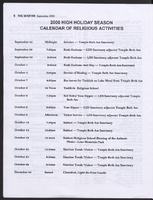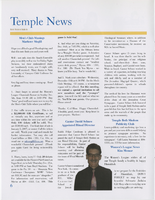Search the Special Collections and Archives Portal
Search Results

Patrick P. Keenan interview, February 28, 1977: transcript
Date
Archival Collection
Description
On February 28th, 1977, collector Clyde C. Caldwell interviewed Patrick P. Keenan (born January 24th, 1905 in New York) at his house in Henderson, Nevada. Mr. Keenan discusses Las Vegas and Henderson in the 1950s. He also speaks about working on the Strip and the changes he has seen in Las Vegas over time.
Text

Ponderosa Motel (American Inn Motel) Neon Survey document, September 16, 2017
Date
Archival Collection
Description
Site address: 3325 Fremont St
Sign owner: American Inn Motel LLC
Sign details: This location has been around since 1968, but mid-2016 it was renovated from the Ponderosa Inn Motel to the American Inn Motel but they use the same sign that was slightly redesigned for their use.
Sign condition: 5- very good condition and shines brightly at night
Sign form: Pylon
Sign-specific description: This pylon sign has a red steel beam base that has a reader board on the bottom portion of the sign. Above the reader board spells out "MOTEL" vertically in white Frontier font letters, with each letter in its own red square. Each letter of this is outlined in red skeletal neon. Above this is a rectangular plastic back lit sign (used to say Ponderosa on it) that now currently has the American Inn logo in it with white letters but a red and blue background. The whole sign is outlined in chasing incandescent light bulbs.
Sign - type of display: Neon, incandescent and plastic back lit sign
Sign - media: Steel and plastic
Sign - non-neon treatments: Plastic back lit portion
Sign animation: Incandescent light bulbs chasing all around the sign.
Sign environment: This property is very east on Fremont in between St. Louis street and Sahara. There are also many other motels and apartments surrounding this property. This motel is right next door to the Lucky Cuss Motel (their old sign is now one of the restored signs in the Las Vegas Signs project showcases on Las Vegas Blvd.).
Sign - date of installation: Has been up since around 2011
Sign - date of redesign/move: 2016 the plastic portion of the sign was swapped out from the Ponderosa motel sign and the American Inn sign that is currently there now.
Sign - thematic influences: The big MOTEL portion of this sign was very prominent on motel signs in the 50's/60's, such as the La Concha and Tam O' Shanter Motel signs.
Sign - artistic significance: Font was an old west Frontier font which was prominently popular in Las Vegas in the 1940's but has been recreated many times throughout Vegas history.
Survey - research locations: Booking.com website has information on the American Inn Motel https://www.booking.com/hotel/us/ponderosa-motel-las-vegas.html , google map sattelite view, Asessor's page
Survey - research notes: When trying to search Ponderosa Motel on google is when it was discovered that it has switched over to the American Inn motel, but google maps helped with dating when the switch occurred.
Surveyor: Emily Fellmer
Survey - date completed: 2017-09-16
Sign keywords: Neon; Incandescent; Plastic; Backlit; Steel; Chasing; Pole sign; Reader board
Text

Transcript of interview with Phillip L. Cook by Richrad Strahan, March 3, 1977
Date
Archival Collection
Description
On March 3, 1977, Richard Strahan interviewed Phillip L. Cook (born 1939 in Las Vegas, Nevada) about his life in Southern Nevada. Cook first talks about his parents’ move to Nevada and then describes how the school system has changed over time. He then describes the first businesses that opened up in the Downtown and Strip areas in Las Vegas before discussing prostitution, Block 16, and recreational activities available to youth. Cook also talks about the first television sets and telephone systems made available, and he moves on to talk about the prices of things such as movies and haircuts when he was younger. The interview then moves to discussions on the Old Ranch, racial discrimination, school integration, the crime rate, and the school system in Las Vegas.
Text
Las Vegas Art League Scrapbooks
Identifier
Abstract
The Las Vegas Art League Scrapbooks are comprised of two scrapbooks, housed in a binder and a pressbook, that were presented as an annual report to the American Artists Professional League in 1967 by the Las Vegas Art League in Las Vegas, Nevada. The collection includes newspaper clippings, photographs, and information about the activities of the Las Vegas Art League during 1966.
Archival Collection
Stella Champo Iaconis Collection of Helldorado Photographs
Identifier
Abstract
The Stella Champo Iaconis Collection of Helldorado Photographs (approximately 1934-1940) contains four black-and-white photographic prints of the Helldorado Days celebration held in Las Vegas, Nevada. Images depict people celebrating at the Apache Bar in downtown Las Vegas.
Archival Collection
Boyd Gaming Corporation Records
Identifier
Abstract
The Boyd Gaming Corporation Records (1994-2006) contain brochures, magazines, reports, and video tapes of the Boyd Gaming Corporation, a Las Vegas, Nevada business specializing in gaming and hotel development.
Archival Collection
Tony Costa Sheet Music and Music Scores
Identifier
Abstract
The Tony Costa Sheet Music and Music Scores (1936-1995) consists of printed sheet music and hand-written scores composed by entertainer, songwriter, and Las Vegas, Nevada orchestra conductor Tony Costa.
Archival Collection
Las Vegas Art League Photograph Collection
Identifier
Abstract
The Las Vegas Art League Photograph Collection contains two photographic prints from between approximately 1960 and 1969. These photographs depict the director of the Las Vegas Art League, Lucile Spire Bruner, along with other individuals viewing and displaying art in Las Vegas, Nevada. Other individuals pictured are Bill Cramer, Miram Kapfer, Irene Chenin, Marge Herzoz, Mary Callahan, and Eleanor Badik.
Archival Collection


